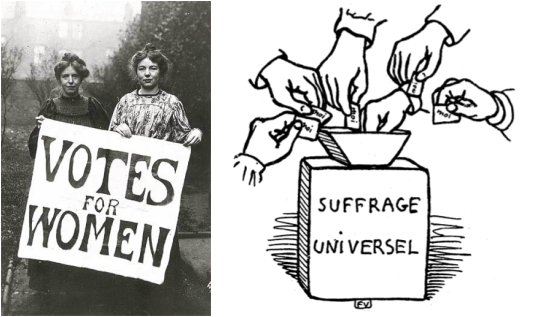By Evangelia Petsa,
Democracy is not a static political system but a dynamically evolving equilibrium, which is tested daily in the context of political and social life by inherent weaknesses and external dangers. Therefore, its proper functioning depends on the existence of certain conditions, which allow the essential realization of democratic principles in the daily life of citizens. One of the most basic prerequisites is the responsible democratic citizen, who, among other things, makes up the electorate by highlighting the political institutions with the vote. In view of the upcoming elections in Greece, it is appropriate to make a reference to the characteristics of the vote, as provided by the Constitution.
The electorate is the set of Greek citizens who have the right to vote or else the “active electoral right”. This right is available to those who have Greek citizenship, have completed the seventeenth (17th) year of age or are about to reach it within the year in which the elections are held, have the legal capacity, and have not suffered an irrevocable criminal conviction for certain crimes (Article 51 par. 3 S.). In order to exercise the right to vote, the voter must be registered in the electoral rolls. Therefore, those who, in accordance with the provisions of the Civil Code, are in a state of complete deprivation of judicial support, and those against whom an irrevocable criminal conviction has been issued for crimes of the criminal and military criminal code do not have the right to vote.
In addition to the right to vote, there is also the passive right to vote, or otherwise, the right to nominate, which allows its holders to run for office in the elections and assume a political position by being elected. With the expression of the right to be “elected”, the person accepts and assumes responsibility for the opportunity given by the state itself to the citizen to actively participate in the decision–making center.

The characteristics of voting are determined by the Constitution. According to Article 51(3), “Deputies are elected by direct, universal and secret suffrage from the citizens who have the right to vote, as defined by law. The law cannot limit the right to vote unless a minimum age limit has been reached or for legal incapacity or as a consequence of an irrevocable criminal conviction for certain crimes”.
So, it becomes clear that first of all, the vote is direct. According to the principle of direct voting, no other intervenes between the voter and the outcome of the election. In other words, it is not possible for the electors to elect some “electors” who in turn will elect the deputies. Similar to the principle of immediacy is the principle of personal exercise of the right to vote, which applies now only to voters who are in the Territory. The exercise of the right to vote through a proxy is not understood. However, the revised article 51(4) of the Constitution provides for the possibility for voters who are abroad to exercise their right to vote “by postal vote or other suitable means”.
At the same time, the vote is universal. Universal suffrage gives the right to vote to all adult citizens, regardless of sex, income, social standing, race, nationality, political beliefs, etc. Anyone who meets the requirements of the law is entitled to be registered in the electoral rolls and to vote. Only those citizens who do not meet the minimum conditions set in an exclusive manner by the Constitution are excluded from the electoral body. The common legislature cannot provide additional grounds for deprivation of the right to vote. The three cases for which exclusion from the right to vote is foreseen are failure to reach the age of 17, which is also considered the year of political adulthood, legal incapacity due to being placed in a state of complete deprivation of legal assistance, as well as deprivation due to conviction for certain crimes in the context of issuing an irrevocable criminal conviction.

It follows from the letter of the law that the vote is also secret. The secrecy of the vote is a basic principle of voting in democracies. It frees the voter from any dependence, pressure, or fear of possible reactions against him. It facilitates and ensures the free and effortless manifestation of his will. And this applies primarily in every case in which, beyond positions and policies, specific persons are judged. The secrecy of the vote means that the electoral will of the voter will not be known to third parties.
The principle of freedom of vote and voting is guaranteed by the Constitution. The said principle protects the freedom and genuineness of the voter’s choice and hence the free and unadulterated manifestation of popular sovereignty. It consists of freedom to form an electoral opinion by having access to the sources of information and to collect the elements that will allow the voter to form an opinion about becoming a politician before going to the polls and freedom of expression of this opinion which aims to prevent phenomena of pressure or coercion against casting the electronic vote.

In the Greek Constitution, there is no explicit recognition of the principle of the equality of the vote. Its registration is based on the provisions that they refer to the principle of universal suffrage (Article 51(3) of the Constitution) but also to the general principle of the equality of Greek citizens before the law (Article 4 (1)). The principle of equality realizes popular sovereignty, as it prohibits discrimination and enforces equal treatment of citizens who are members of the electoral body. The duplicate content of the principle of equality is as follows: each voter has only one vote. Therefore pricing (the awarding of the vote on the basis of the economic status of the voter) and multiple voting (the exercise of the electoral right more than once depending on the contribution of some qualifications) are prohibited. Also, multiple voting, i.e. exercising it, is prohibited suffrage in more than one electoral district; but also the principle means that all votes are legally equivalent.
Taking into account all the above, the right to vote and to be elected is a right and at the same time an obligation of the electorate and of course it should be exercised with the interest of the state in mind. So in order to have a quality democracy and to realize its purpose citizens should be critical thinkers, multifacetedly informed, intellectually cultivated, responsible, and active.
References
- Σύνταγμα της Ελλάδος–Κανονισμός της Βουλής. Νοέμβριος 2019, εκδ. Lexbook.




